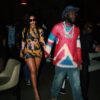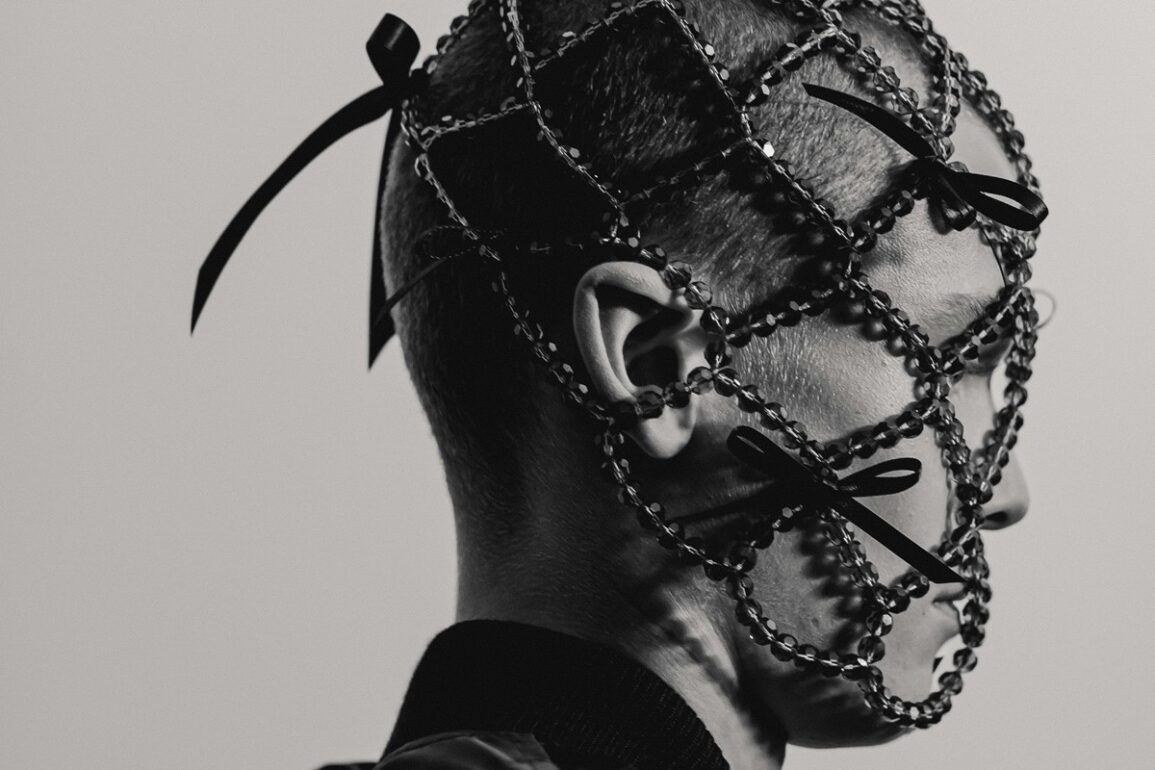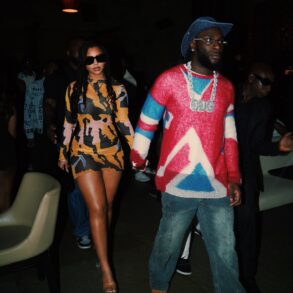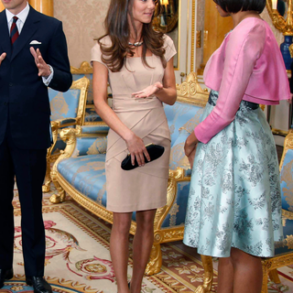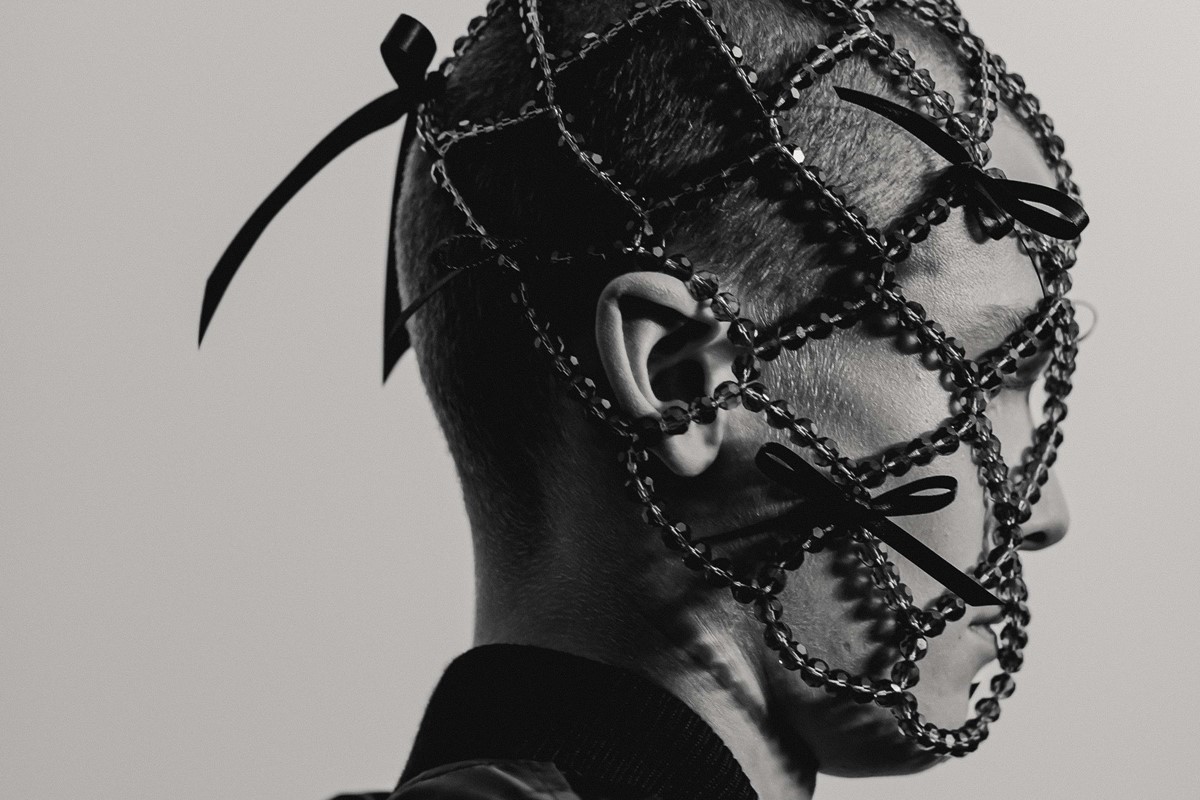
From Aaron Esh’s refined runway debut to Chopova Lowena’s riotous takeover of a west London skatepark, here are the best shows from London Fashion Week Spring/Summer 2024
Clothes, and their inner workings, were the simple focus of Molly Goddard’s beautiful show. Held in the stately rooms of Christie’s auction house, the designer sent out a gentle, pared-back collection where clothes were turned inside-out, their innards made external, with bra seam lines, zip plackets and zig-zag stitching all left exposed. With her research unfolding at the National Theatre costume hire, focusing on underskirts and underwear – things like crinolines and Georgian underskirts – Goddard said, “This collection is very much about making clothes, which is my favourite thing to do.” Gone are the days of the designer’s splashier, mountainous tulle dresses; as the brand matures, so too do its clothes (along with the casting, which featured more plus-size models than ever before). It’s also refreshing not to see models struggling down the catwalk in sky-high heels; instead, Goddard sent her women out in sensible ballet flats, trainers, or lace-up boots in metallic silver and pale pink.
Read AnOther’s feature on the show here.
Held at Tenderbooks in Covent Garden for an intimate audience of less than 30 people, Talia Byre’s third ever runway show took its tonal inspiration from the early, salon-style shows of Paco Rabanne and Sonia Rykiel. Theosophical colour mysticism was the focus here, with the young designer referencing Annie Besant’s 1905 book Thought Forms; looks included delicious, candy-coloured striped twin-sets and splodgy polka dot tights paired with brazen, patterned socks rolled thickly over matching heels. With wine on offer from Lant Street Wine (where the brand held its previous show) despite the drizzly weather, this show was a family affair, memorable for its sense of sexiness, bold colour, and intellect.
In a basement car park in the Barbican – Chamberlin, Powell and Bon’s brutalist marvel – Supriya Lele held her first runway show in nearly a year (and her first without the support of Newgen). Her signature, slinky ensembles – billowing dresses, sheer shirts, and silky twin-sets – were back, created anew this season in splashes of colour (the lilac references a lipstick worn by artist Jai Chuhan during her show opening at Lele’s new south London gallery Qrystal Partners, while a crackly, iridescent green was taken from a snapshot of a stranger’s shade of eye shadow). Lele has a way of repurposing the fashions of her Indian heritage – combined with allusions to British punk – into something irresistible, and this season, the booming soundtrack mirrored the ethos of Lele’s own clothes – luxurious, laidback, and sensual.
Leaving behind her usual ornate, historical show locations – the Old Bailey, Lincoln’s Inn and Central Hall Westminster, to name a few – Simone Rocha debuted her new collection instead at the English National Ballet all the way in Canning Town, underneath towering new builds. This season, the Irish designer honed in on the idea of the dress rehearsal – specifically, the wedding dress rehearsal. Around a fantastical white structure created by set designer Rory Mullen, models walked in cake-inspired tiers of appliqué echoing the visual language of wedding ceremonies, white shirt-and-trouser sets evoking lace tablecloths, and dresses with roses slipped in between layers of tulle.
See Paul Phung’s photo essay from the show here.
Is there a more well-established modern tradition than falling for a skater boy? This was the question on Emma Chopova and Laura Lowena-Irons’ minds while designing their S/S24 collection, which unfolded underneath the Westway in beloved skatepark Bay Sixty 6. Though no boys could be seen kickflipping or shredding down the venue’s polished concrete ramps, the essence of the sport could be felt throughout the collection, in graphic tees, baggy shorts and plaid pyjamas – some modelled by tattooed, real-life skater boys. Heston’s Flora Day festival – a Cornish festival held in May – was also a point of reference, with the brand’s signature folkloric and mediaeval obsessions refined through a contemporary, girly lens. Chopova Lowena debuted their first ever bags and shoes too, with Uggs weighed down by mountains of jangly charms and ribbons. Despite being their second ever runway show, this was a joyous, infectious affair.
Sinéad O’Dwyer broke with the runway format this season, instead opting for a thoughtful conversation alongside writer Mahoro Seward about the lack of body diversity in fashion – specifically, the problem with sample sizes, and what O’Dwyer is doing to amend this glaring issue. As models catwalked through a light-filled studio at the Royal College of Art – where O’Dwyer studied – the designer talked about her struggles with mental health and body dysmorphia, and her obsession with uniforms. Hybrid shirt-leotards accommodating for larger busts were paired with the designer’s signature knitted bodysuits, encrusted this time in jewels and made in an array of girly, vibrant colours.
On Friday, fashion’s press elbowed their way into Yeomanry House in Bloomsbury as Fashion East showcased the designs from the incubator’s current roster. A newcomer to the initiative, recent Central Saint Martins graduate Olly Shinder debuted his first runway show with a collection that pondered what it means to be ‘in touch’ today, featuring the designer’s signature appropriations of the utilitarian workwear wardrobe adapted through a queer lens. Standing Ground followed with Michael Stewart’s third collection under Fashion East, presenting sculptural yet fluid evening gowns, which bolstered beaded embellishments that coursed over the body in liquid formations. Estonian designer Johanna Parv continued her study into the daily uniforms of cyclists in the city, this time focusing on power dressing, showing nipped waists and suit-inspired dresses in performance textiles. The show closed with a guest spot from cult favourite Asai, who first showed with the incubator for Autumn/Winter 2017. His new collection came replete with his signature acidic colour palette, energetic tassels and sensual displays of skin.
When guests were sent blue playdough as the invitation for JW Anderson’s Spring/Summer 2024 show, they surely received their first hint that this was to be no ordinary collection. Lo and behold, in walks the first look, a hunched hoodie and shorts made out of clay. It’s never seemed to matter much to Jonathan Anderson that his runway looks are particularly wearable – remember his dresses at Loewe made of a supersized anthurium flowers? – but it’s his most bizarre looks that are a vehicle for commentary on the state of affairs today. This time, it was the designer’s own hope for more playfulness within dressing. Giant plumes of feathers came haphazardly stuck to bomber jackets, T-shirts and trousers were shiny and padded, while bandage dresses were unwrapped to reveal skin beneath. This offering was a joyful evolution of our basic wardrobe, utilising a craftsmanship that’s far from child’s play.
Shown in a specially erected Burberry-fied tent in Highbury, north London – with flasks waiting at each seat – Daniel Lee’s second mainline collection was a contemporary love letter to life in the great outdoors, with a knowing eye on the unpredictable English weather. Trenches – a lot of them – were reimagined for summer, with low-slung belts that hug below the hips. Prints were abstracted by jewellery and hardwear, which became flowers and fruits towards the show’s climax, inspired by English gardens and their whimsical harvests. Embracing the clichés of pastoral living, Lee is carving out a new, luxurious path for the Burberry customer through the leafy English countryside, come rain or shine.
On the sixth floor of the Tate Modern’s Blavatnik tower, as the sun set over St Paul’s Cathedral on the last day of London Fashion Week, Aaron Esh presented his first ever runway show under the Newgen initiative. There was another first for the young London-based designer – the introduction of womenswear. Inspired by the chaos of the city, its hedonism and frenetic streets, Esh’s offering for S/S24 was decidedly contemporary and refined, showcasing sumptuously lean fluid dresses and jackets with trailing lapels and neck-ties as if hurriedly put on to lend to the rhythmic pace of city living. Adapting the spirit of youth culture with the quiet luxury of French couture, Esh’s perfectionism befits a designer decades his senior, while sustaining a well-practiced awareness of the codes of our restless British adolescents.
Opening the London Fashion Week schedule as the last of the sunshine bid its overdue farewells, Stefan Cooke offered a sun-drenched menswear collection inspired by life in warm weather. Minimally styled to bear the skin beneath, the show opened with sun-bleached studded ponchos which gave way to low-slung skirts. Nods to Americana arrived through quarterback silhouettes, stars and stripes, and foam fingers, while a collaboration with English accessories brand Mulberry solidified its positioning in luxury, which bolstered their signature whimsical ribbon bows and vintage rugby shirt tassels, in an evolution of the style vocabulary of the cult British label.
Headed by British-Nigerian music artist, producer and Another Man cover star Skepta, Mains’ first fashion show on the London Fashion Week calendar elevated the style of the streets. Staged on an Astroturf tennis court in the middle of Banking Hall, with stars Naomi Campbell, Givenchy designer Matthew Williams, Stormzy, Little Simz and Louis Theroux sat front row, the musician’s first show debuted slinky sportswear amid classic tailoring, rich leathers, and denim dungaree sets.
This post was originally published on this site be sure to check out more of their content.



